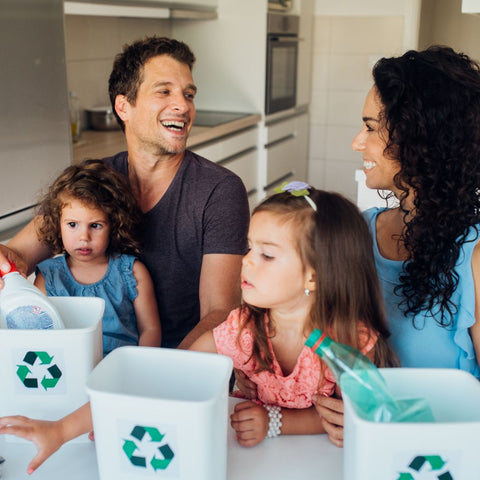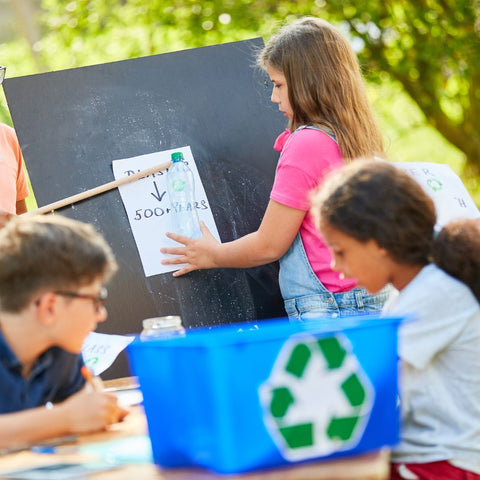
Here's How to Teach Your Kid About Global Recycling Day

Have you ever wondered how to make the concept of recycling exciting and engaging for your children?
With Global Recycling Day approaching, there's no better time to introduce the younger generation to the importance of recycling and how it can be a fun, rewarding activity that contributes to the health of our planet.
As parents, we have the unique opportunity to shape our children's attitudes and behaviours towards environmental stewardship, making every day a chance to teach them about the importance of being eco-friendly.
This guide aims to provide you with practical advice and creative ideas to make recycling a fascinating and impactful part of your children's lives.
What is Global Recycling Day?
Understanding the Significance
Global Recycling Day was created to recognise and celebrate the vital role recycling plays in preserving our precious natural resources and securing the future of our planet.
It's a day to bring global attention to the importance of recycling, encouraging everyone, young and old, to think about what they can do to help.
By explaining the origins and goals of this special day to your children, you're not just educating them about a date on the calendar; you're inviting them to be part of a worldwide movement.
Why Recycling Matters
The Environmental and Economic Benefits
Recycling is not just about reducing waste; it's about protecting our natural resources, saving energy, and reducing greenhouse gas emissions.
When we recycle, we contribute to the circular economy, a system that aims to keep products, materials, and resources in use for as long as possible.
This section will delve into the importance of recycling and how it helps in the conservation of resources and the reduction of pollution, making it an essential practice for a sustainable future.
Engaging Kids in Recycling

Understanding Recycling
Begin by explaining to your children what recycling involves and why it is crucial.
Use simple, relatable examples to show how recycling works and its benefits to the planet.
Related: 5 Cool Ways To Teach Children To Care For The Planet
Practical Involvement
Encourage your kids to participate in recycling by introducing them to the concept of separating waste, using reusable containers, and understanding which materials can be recycled.
Turn these activities into fun, educational games to spark their interest.
Creative Projects
Engage your children with creative recycling projects, such as crafting with recycled materials or starting a compost bin.
These hands-on activities not only teach them about recycling but also about creativity and resourcefulness.
Making Recycling a Family Challenge
Engaging your children in recycling can be transformed into an exciting game with the introduction of a family recycling challenge.
This not only makes the act of recycling more enjoyable but also instils a sense of responsibility and teamwork.
Here's how to create a fun and competitive recycling environment at home:
- Set Clear Goals: Begin by setting clear, achievable recycling goals for each week. Whether it's reducing waste by a certain percentage or recycling a specific number of items, having a goal in mind gives everyone a target to aim for.
- Track Progress: Keep a visible chart or board to track each family member's contributions to recycling. This could include the number of items recycled, the reduction in household waste, or creative ways they've found to reuse materials.
- Introduce Rewards: Motivate your family with rewards for meeting recycling goals. This could be as simple as choosing the next movie for movie night or a small, eco-friendly gift. The key is to make the rewards desirable and related to the effort put in.
- Encourage Creativity: Challenge family members to come up with new and innovative ways to recycle or reduce waste each week. This could include finding new uses for old items, crafting with recyclable materials, or coming up with ideas to cut down on plastic use.
- Share and Reflect: At the end of each week, have a family meeting to discuss what was recycled, any new ideas developed, and how these efforts contribute to environmental conservation. This reflection time helps reinforce the importance of recycling and allows for the celebration of achievements.
Celebrating Global Recycling Day with Kids
Participating in the #RecyclingHeroes Campaign
This year, Global Recycling Day is all about celebrating #RecyclingHeroes—those individuals, communities, and businesses making significant contributions to recycling efforts.
Discuss with your children how they can be recycling heroes in their own right, perhaps by initiating a recycling project at school or within the community.
This encourages them to think beyond their immediate environment and consider their impact on the global community.
Local Events and Community Participation
Global Recycling Day is not just an opportunity to focus on recycling at home but also a chance to engage with your wider community.
Here are some ways to get involved:
- Research Local Events: Look for recycling drives, clean-up activities, or educational workshops happening in your community. Participating in these events can be a fun and meaningful way for your family to celebrate Global Recycling Day.
- Organise a Community Clean-Up: If there aren't any events in your area, consider organising a community clean-up yourself. Gather neighbors, friends, and family to clean up local parks, beaches, or streets. This not only helps the environment but also strengthens community bonds.
- Visit Recycling Facilities: Some recycling centers offer tours or open days, especially around Global Recycling Day. Visiting these facilities can be an educational experience for the whole family, providing insight into what happens to recyclables after they leave your home.
Comprehensive Recycling Tips for Families
Offering families a treasure trove of tips and strategies for incorporating recycling into their daily lives.
From understanding the recycling symbols on packaging to creative ideas for reducing waste, this section aims to make recycling a simple, seamless habit for everyone at home.
Setting Up a Home Recycling Station
Creating a home recycling station that is both functional and kid-friendly can significantly simplify the recycling process for your family.
Follow these steps to set up an effective system:
-
Understand Local Recycling Rules and Regulations:
- Start by researching and understanding the specific recycling guidelines in your area. Knowing what materials are accepted and how they should be prepared is crucial for an effective recycling process.
-
Evaluate Your Recycling Trends and Needs:
- Take a look at the types and volumes of recyclables your household produces. This assessment will help you decide on the size and number of bins needed for your recycling station.
-
Optimise Storage and Categorisation:
- Select containers that are lightweight, have clear labels for different types of recyclables (e.g., paper, plastic, glass), and are easy to clean. Place your recycling station in a convenient spot, like the kitchen or utility room, to encourage its use.
-
Customise the System to Your Family's Needs:
- Adapt the recycling station to fit your family's lifestyle. For example, if your family consumes a lot of canned goods, consider a separate bin for metals. The key is convenience; the easier it is to use, the more likely your family will stick to the recycling habit.
-
Abide by Local Regulations:
- Ensure that your recycling efforts are in line with local regulations. Proper sorting and disposal not only avoid penalties but also support the efficiency of recycling programs.
Empowering Kids to Be Environmental Advocates
Encouraging your children to be environmental advocates is about giving them the tools and confidence to make a difference.
Here's how to nurture their advocacy:
- Educate on the Impact: Teach your children about the broader impacts of recycling and environmental conservation. Use stories, documentaries, and interactive resources to illustrate how their actions can contribute to a healthier planet.
- Encourage Sharing: Motivate your children to share what they've learned about recycling with friends, classmates, and extended family. This could be through school projects, presentations, or casual conversations.
- Support Their Initiatives: If your child shows interest in starting a recycling project at school or organising a community event, offer your full support. Helping them to plan, gather materials, or spread the word can empower them to take meaningful action.
Conclusion
Teaching our kids about Global Recycling Day and the broader importance of recycling is an investment in the future of our planet.
By taking the time to engage with them on this topic, we're not only educating them about the significance of environmental stewardship but also empowering them to make a difference.
Whether through practical recycling activities, creative projects, or celebrating the achievements of #RecyclingHeroes, there are countless ways to make recycling a fun and meaningful experience for children.
Let's use this Global Recycling Day as a springboard to inspire the next generation of eco-conscious individuals, ready to take on the challenge of preserving our planet for future generations.
Together, we can make a world of difference, one recycled item at a time.
FAQ: Teaching Your Kid About Global Recycling Day
How can I explain the importance of Global Recycling Day to my young child in a way they'll understand?
Explain to your child that Global Recycling Day is like the Earth's birthday, a special day where everyone helps clean up and take care of our planet. Tell them it's a day when we learn how to make less trash by reusing and recycling things, so the Earth can be a happier and healthier place for everyone to live.
What are some simple recycling activities I can start with for my young children?
Begin with basic sorting games. Create colourful bins for different materials (paper, plastic, and metal) and turn recycling into a matching game. Another idea is a 'treasure hunt' where children find items around the house that can be recycled or repurposed, teaching them to identify recyclable materials in a fun way.
How can I keep my child interested in recycling beyond Global Recycling Day?
Keep the momentum going by integrating recycling into your daily routine with fun and educational activities. Celebrate small wins with positive reinforcement, like stickers or extra playtime for consistent recycling efforts. Additionally, involve them in DIY projects that repurpose recycled materials into art or useful items for the home, showing the tangible outcomes of their recycling efforts.
Are there any child-friendly resources or apps that can help teach my child about recycling and environmental conservation?
Yes, there are several educational apps and websites designed with children in mind that focus on recycling and the environment. Look for interactive games and stories that teach children about recycling processes, the importance of conserving resources, and how they can make a difference. Examples include the National Geographic Kids website, which offers engaging content on recycling and conservation, and the Recycle City app by the Environmental Protection Agency, which allows kids to explore how recycling works in a community.
Get in Touch 🚀
Loved our article on “Here's How to Teach Your Kid About Global Recycling Day” Got the itch to dive into more wheely-awesome info?
Whether you're a parent or a grandparent, we're here for all your kids ride-on toy questions! 🚗💨
Feeling click-happy?
Jump straight into our wonderland at RiiRoo.com.
Or, if you're more the chatty type, give our Live Chat a whirl and let's talk toys!

